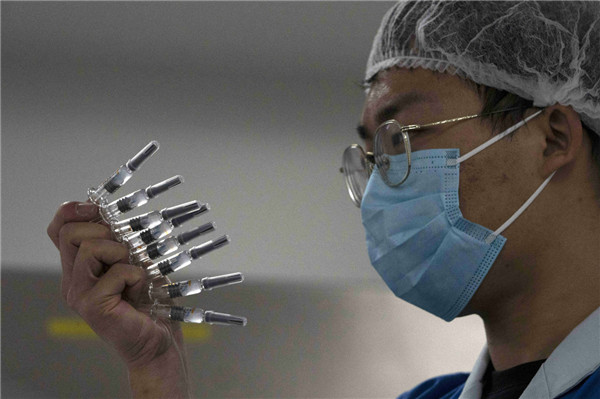Home> News
Trials of China's vaccines make major progress
Updated: 2020-10-21 (China Daily)

A laboratory technician inspects syringes of a COVID-19 vaccine produced by Sinovac Biotech Ltd at its factory in Beijing on Sept 24. [Photo/NG HAN GUAN/AP]
No severe adverse effects reported in 60,000 recipients, science official says
No recipient of China's COVID-19 vaccine approved for emergency use has reported severe adverse effects, and no vaccine recipient who went to work in countries where the pandemic is still ongoing has been infected, officials said on Tuesday.
China currently has 13 vaccine candidates in clinical trials, of which three inactivated vaccines and one adenovirus vector vaccine are in phase three trials overseas, said Tian Baoguo, deputy head of the Department of Science and Technology for Social Development of the Ministry of Science and Technology.
About 60,000 volunteers have been inoculated with the four vaccine candidates currently in phase three trials, Tian said at a news briefing held by the Joint Prevention and Control Mechanism of the State Council.
No severe adverse reaction has been reported among them, and preliminary results show that these vaccines are generally safe and only have minor side effects such as pain and bruising at the injection site, as well as temporary low-grade fever, he added.
Liu Jingzhen, chairman of China National Pharmaceutical Group Co, or Sinopharm, said third-stage clinical trials of two inactivated vaccine candidates developed by the company are being conducted in 10 foreign countries, including the United Arab Emirates, Jordan, Argentina, Egypt and Peru.
"The current feedback is very satisfactory and we have received wide recognition from the international community," Liu said, adding that there are now dozens of countries asking for the company's vaccines.
Zheng Zhongwei, head of China's COVID-19 vaccine development task force, said the nation's annual COVID-19 vaccine production capacity could reach 610 million doses this year and it will expand further next year. Liu said his company would achieve an annual production capacity of 1 billion doses next year.
When asked about the emergency use of a COVID-19 vaccine candidate in China, Zheng said China is currently facing great pressure from small clusters of outbreaks domestically and from imported cases.
As a result, it is a necessary measure to approve COVID-19 vaccines for emergency use in high-risk demographics, such as front-line medical personnel, border staff, people traveling overseas to work and essential workers, he said.
"China's vaccine emergency use authorization process is strictly governed and conducted in accordance with related laws and regulations," Zheng said, adding that China has notified the World Health Organization's representative in the nation about the emergency authorization and has received the organization's understanding and support.
Meanwhile, an approval committee headed by Zhong Nanshan, China's leading respiratory disease expert, along with other top experts in law, ethics and clinical medicine, is tasked with screening and selecting which vaccine gets approved for emergency use, Zheng said.
All vaccine recipients are voluntarily inoculated and are fully aware of the risks involved, Zheng said, adding that there are mechanisms to closely monitor the recipients for any adverse effects should they occur.
"We have not received reports of any recipient of the Chinese COVID-19 vaccine approved for emergency use as having severe adverse effects," Zheng said, adding that there was no report of infection after they arrived at their destination country.
Gao Qiang, general manager of Chinese vaccine maker Sinovac Biotech, said the company has established a robust adverse effect monitoring system in accordance with global guidelines with all its foreign partners, including in Brazil, Indonesia and Turkey.
"We have not received a single report of vaccine-related severe adverse effects from our partners," he said.
Domestically, China has a world-class adverse effect surveillance system that is certified by the WHO for vaccines on the market, according to the Chinese Center for Disease Control and Prevention. This system has played a key role in tracking and investigating vaccine-related adverse effect incidents over the past decade, it added.
Zhao Xing, a Foreign Ministry official, said China is proactively fulfilling its promise of making COVID-19 vaccines a global public good and promoting equitable access to safe and effective vaccines, especially for developing countries.
On Oct 8, China joined COVAX, an initiative co-led by the WHO and partners to ensure efficient and equitable global access to a COVID-19 vaccine. As of Tuesday, 184 countries and regions have joined the initiative.
"Our vaccine development is leading the world, and we have enough production capacity, but we still want to join COVAX because we want to promote equal and fair access to the vaccine under the initiative," Zhao said.
"By joining the initiative, hopefully we can encourage more countries to participate in the project as well," he said, adding that China will enhance international collaboration to contribute to global public health and safeguard the well-being of people around the world.
